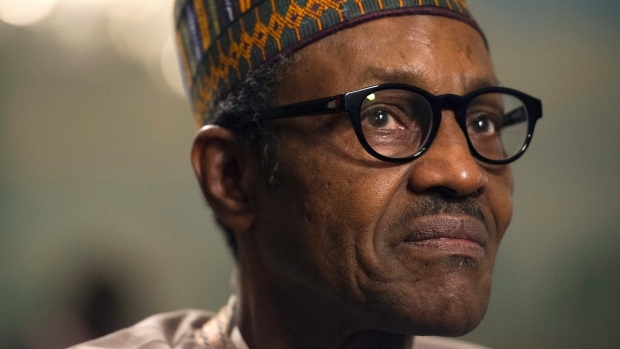 Nigeria President. Muhammadu Buhari.[/caption]
Nigeria President. Muhammadu Buhari.[/caption]
Reality for Nigerians comes harder by the day. Investors told the Finance minister Kemi Adeosun in London this week that in the current climate even a high-yielding sovereign bond would be a tough sell so long as currency controls remain in place.
International airlines, meanwhile, are grumbling about $1bn in earnings trapped in Nigeria as a result of foreign exchange restrictions brought in last year as an unorthodox response to the collapsing oil price.
Two airlines — United, which ran weekly from Houston, and Iberia — have suspended flights partly as a result. The main companies connecting Africa’s largest economy and leading oil producer to the outside world, among them British Airways, Emirates and Virgin Atlantic, have no immediate intention of following suit. There is symbolism in this nonetheless. It points to how stranded Nigerians might become if their economy veers further into freefall.
Advertisement
It also suggests the central bank is withholding hard currency to shield reserves, and may have much greater obligations beyond the airline industry — hardly a recipe to inspire confidence.
There is no doubt Muhammadu Buhari was dealt a terrible hand when he assumed power over the country in the wake of an unprecedented victory over incumbent president Goodluck Jonathan. Just over a year later there is a growing sense that Mr Buhari’s government is making that bad hand worse.
This is not entirely fair. Efforts to sanitize public finances, recover looted funds, and punish offenders are bearing some fruit.
The austere former military ruler arrived to a collapsing oil price after a bonanza of corruption and conspicuous consumption had bled the country of savings. For all the boom years, the giant infrastructure deficit remained largely unaddressed. Festering sores within society were still festering.
Advertisement
Now fresh tensions are beginning to boil over, notably in the long-neglected Niger delta where much of Nigeria’s oil is produced. As a result of uncertainty over the country’s ability to deliver cargoes in the wake of renewed attacks on oil infrastructure by Niger delta militants, refineries are cancelling orders for Nigerian oil. So, on top of everything else, the price Nigeria commands for its oil has also been hit.
A back-of-envelope calculation highlights the scale of the resulting crisis in public finances. Strip out the approximately 700,000 barrels per day of oil lost to recent sabotage, all of it from onshore joint ventures where the state reaps a much higher proportion of earnings than from offshore production contracts in which oil companies gain the greater rewards. Then factor in the amount of crude oil that Nigeria uses to secure swaps for fuel imports to meet domestic demand, because its own refineries are barely functioning. The combined losses suggest the Nigerian state, which depends on oil typically for around two-thirds of revenues, is operating with a quarter or less of what it had two years ago.
It is unclear which multilateral or bilateral finance institutions will come to the rescue. It looks unlikely now to be bond markets.
In these circumstances it is clear that Africa’s largest economy will have to accommodate further shocks and that, ultimately, this will have to be recognized in the official value of the currency. Nigeria masquerades — when oil prices are high — as a rich country. For now it is looking poor.
Originally posted on Financial Times


